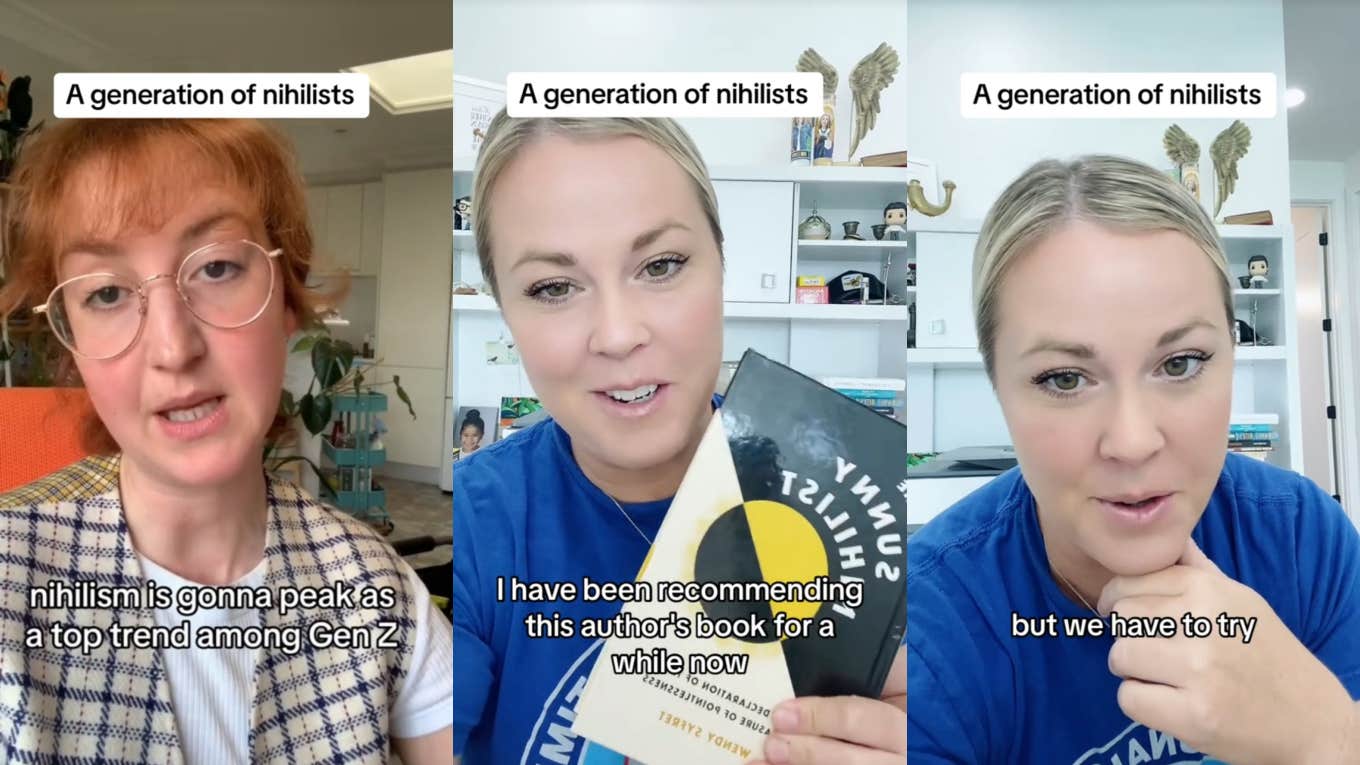Spiritual Director Explains Why She's Worried About Gen Z's Nihilism & What It Likely Means For The Future
Nietzsche's outlook looks grim, but Brittney Hartley believes that not all is lost.
 @nononsensespirituality / TikTok
@nononsensespirituality / TikTok A woman named Brittney Hartley has dubbed herself something of a spiritual explorer after spending years of her life devoted to learning about the human experience and achieving multiple degrees in applied, open and relational theology.
The subject of one of her most recent TikToks talks about similar subjects, but also asks a question that the famous 1800s philosopher Friedrich Nietzsche sought to answer when he said “God is dead,” and that’s: How will Gen Z face nihilism?
Brittney Hartley explains what’s good and bad about the ways Gen Z is handling nihilism.
In Hartley’s video, she stitches someone else’s TikTok in which they claim nihilism will peak as a top trend in Gen Z by 2025. There are many reasons why nihilism has grown in popularity among the youth, and a large part of it seems to be the aversion to organized religion and the imbalance of power as a whole.
She tackles various subjects and asks questions about what this all means before explaining what she believes it all means for Gen Zers and the future of human society.
Depending on your age and how active you are on social media, you’re likely to have come across a Gen Zer whose humor you didn’t quite understand — or maybe, you understood what that humor was trying to poke at, but didn’t find it funny.
Why are kids these days laughing about finding no meaning in life? Why do kids even feel this way? What happened to finding your own purpose, and why is everyone laughing at the doom and gloom of it all? Well, you’ve stumbled across nihilism and the way Gen Z continues to adapt in handling that nihilism.
Nihilism is the rejection of religious and moral principles in the belief that life is utterly meaningless. A lot of Gen Zers seem to approach life in this nihilistic manner. It’s written in the way they talk, the things they laugh at, and the way they react to news, media and society in general.
Nietzsche feared a society that would have to face nihilism, but Hartley says there are good and bad signs of the future to come.
The big question that Nietzsche asks is: Can humans overcome this? The dissolution of morality and meaning seems scary, but does it have to be a bad thing? Hartley doesn’t seem to think so, at least not entirely.
“I would say the markers that they are not doing well [are] the statistics of suicide, depression, anxiety, and numbing behaviors,” she explains. According to new research published in 2022 by the Walton Family Foundation and Murmuration, there’s a slow crisis unfolding among the Gen Z population.
“Gen Z is about twice as likely (42% to 23%) to battle depression and feelings of hopelessness,” they reported. “They are also three times as likely (18% to 5%) to say their challenges are so severe that they have had thoughts of self-harm or that they might be better off dead.”
Hartley attributes that some of this might have to do with the overwhelming popularity of nihilism. She also believes that, since Gen Z seem to be void of any meaning in their lives, they turn to other things in order to find meaning.
“That they as a generation turn to the superstitions of astrology and the crystal world is also a concern of mine,” she explains, circling back to add that she’s a fan of “the rise of the feminine and the occult,” but it ultimately amounts to people looking for some kind of meaning since they can’t find it in religion.
The first good sign that the future is bright is the amount of resources being developed that people never had access to before.
One thing she wanted to highlight was a “Science of Wellbeing” course that became so popular with Gen Z at Yale that they made it a free online course that millions of people have taken.
Not only that, but Gen Z is very active in activism. Hartley sees this rise in activism as a way for Gen Z to find some kind of spiritual meaning in making the world a better place. There’s a re-emergence of philosophy, a reevaluation of materialism, and a growing concern for the environment that we live in.
It’s likely that there will be more signs of good and bad things to come as Gen Z continues to adapt to the growing trend of nihilism, but Hartley tries to end things on a good note. Although Nietzsche didn’t believe that the average person or society could survive nihilism, Hartley believes “we have to try.”
Isaac Serna-Diez is an Assistant Editor for YourTango who focuses on entertainment and news, social justice, and politics.
